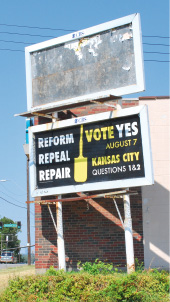
By LESLIE COLLINS
Northeast News
July 25, 2012
Weathered and tattered billboards don’t reflect well on Kansas City, and the City of Kansas City is ready to take action.
During the July 19 City Council meeting, City Council members passed two resolutions regarding billboards.
City officials estimate that at least 400 billboards of varying sizes exist in Kansas City.
“I think in general, we like clean neighborhoods and clean commercial areas; many times, billboards don’t seem to fit into that,” City Council member Scott Wagner told Northeast News.
Currently, the city is considering imposing a two percent tax on the gross revenue of billboards, as allowed by Missouri statutes.
If approved by voters, the revenue could be used to enforce billboard ordinances or fund beautification projects, said City Council member Ed Ford.
City officials are still deciding whether or not to put the question on the ballot in November, Wagner said. City Council members will decide whether or not to place the two percent tax on the ballot following a fiscal analysis of the potential tax. City Manager Troy Schulte has been tasked with the analysis, which will evaluate potential revenue, if the revenue can fund enforcement staff costs and other alternatives for spending the revenue. Schulte must report back to the city’s Planning, Zoning and Economic Development Committee within 90 days.
Maryland Heights, Mo., which has slightly more than 20 billboards, uses its billboard tax revenue for landscaping projects near the entrance and exit points of the city, Wagner said.
City Council members also approved a resolution directing the city manager to conduct an inventory of billboards throughout the city.
“It’s a good idea, and we really should do a better job of enforcing what’s on the books,” City Council member Scott Taylor said of surveying the billboards.
In addition to enforcing imminent domain to remove a billboard, the city can require that a billboard company tear down a sign if the city determines the billboard is no longer being used or if the billboard structure is in poor condition, Wagner said. The company must pay for removal costs.
“What we’d like to have is a clean, attractive city, and when billboards are allowed to degrade, then it sends the opposite message,” Wagner said. “They can easily become a blighting influence if allowed to deteriorate. So, our objective is to get control of these blighting influences wherever we can.”
















